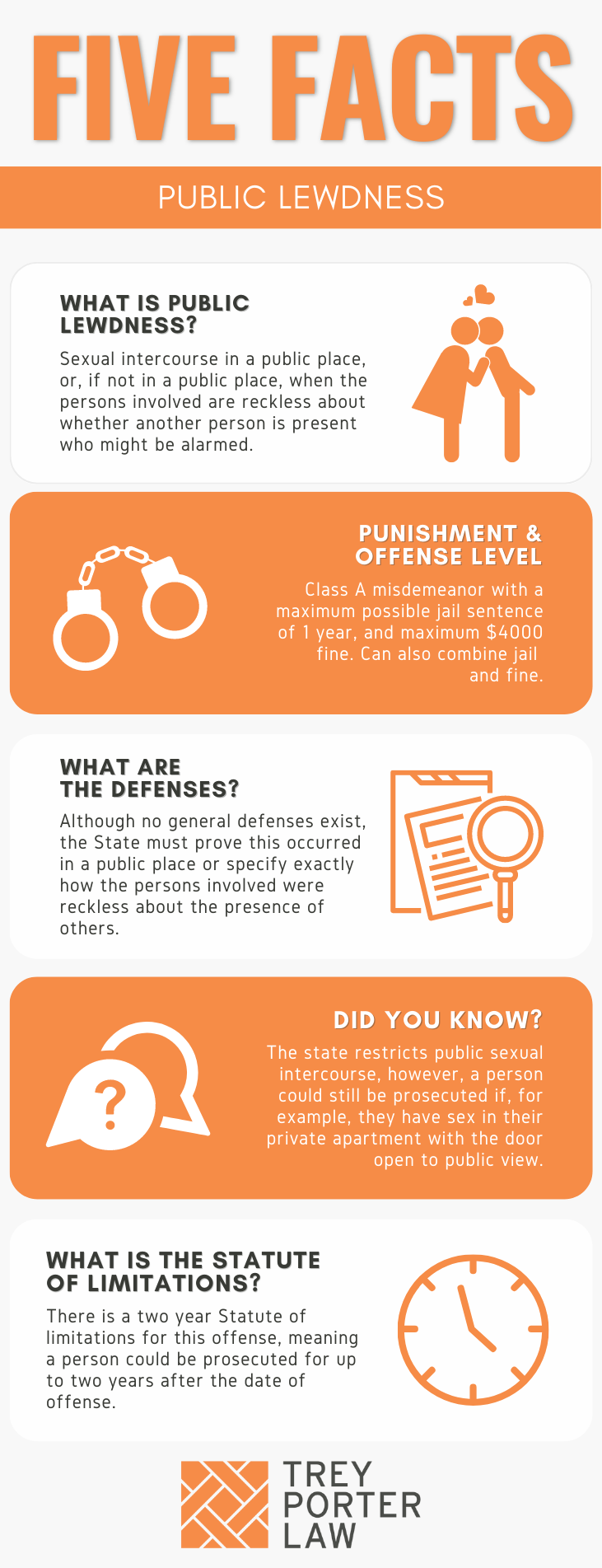WHAT IS PUBLIC LEWDNESS IN TEXAS?
The public lewdness statute outlaws sexual acts in public, or in a private place where it is likely that another will be present and see the sexual conduct. Texas law generally does not regulate consensual sex between adults, as long as it is done in private.
WHAT IS THE PUBLIC LEWDNESS LAW IN TEXAS?
Tex. Penal Code § 21.07. PUBLIC LEWDNESS.
(a) A person commits an offense if the person knowingly engages in any of the following acts in a public place or, if not in a public place, the person is reckless about whether another is present who will be offended or alarmed by the person’s:
(1) act of sexual intercourse;
(2) act of deviate sexual intercourse; or
(3) act of sexual contact.
(b) An offense under this section is a Class A misdemeanor.
WHAT IS THE PENALTY CLASS FOR PUBLIC LEWDNESS IN TEXAS?
Public lewdness is a Class A misdemeanor, punishable by up to one year in county jail.
WHAT IS THE PUNISHMENT RANGE FOR PUBLIC LEWDNESS IN TEXAS?
The punishment range for public lewdness, a Class A misdemeanor, is up to one year in jail, and up to a $4,000 fine.
WHAT ARE THE PENALTIES FOR PUBLIC LEWDNESS IN TEXAS?
As an alternative to jail time, a person accused of public lewdness is eligible for probation after a conviction, or deferred adjudication after a plea of nolo contendere (“no contest”) or guilty to a judge. The maximum period of either type of community supervision is two years.
WHAT ARE THE DEFENSES TO PUBLIC LEWDNESS IN TEXAS?
The most common defense is to argue the location of the offense was not a public place.
- What is the Texas legal definition of “public place”? Texas law defines a “public place” as any place to which the public or a substantial group of the public has access. Public places include, but are not limited to, streets, highways, and the common areas of schools, hospitals, apartment houses, office buildings, transport facilities, and shops. In public lewdness cases, courts have upheld several locations as “public,” including parking lots, dressing rooms, communal showers in gym locker rooms, and adjoining booths in theaters.
- Can you be charged with Public Lewdness in private? A person may still be charged with public lewdness, even if the sexual conduct is in a private location, as long as it is shown that the person was “reckless about whether another [was] present who [would] be offended or alarmed” by the sexual acts. Even if the person doesn’t know anyone else can see them, if they were reckless about their sexual conduct, this nonetheless constitutes public lewdness.In Smith v. State, a defendant called his 14-year-old neighbor and told her to look out the window. The defendant’s bedroom window was within view. She did not see anything, but told her parents about the call. Her father walked to the defendant’s home, where he saw the defendant and his wife engaging in fellatio directly in front of the window. The defendant was convicted of public lewdness. The appellate court affirmed, finding that he was reckless about whether another was present who would be alarmed by his behavior. 200 S.W.3d 644 (Tex. App.—Houston [1st Dist.] 2001, pet. ref’d).In Hines v. State, a defendant took his friend’s 13-year-old daughter to a secluded area on his friend’s land and touched her inappropriately. The appellate court reversed the defendant’s conviction for public lewdness, holding that the defendant was not reckless about whether another person was present who would be alarmed or offended. He should have been prosecuted for indecency with a child, which has no “public place” or third-party presence requirement. Hines v. State, 906 S.W.2d 518 (Tex. Crim. App. 1995).
WHAT IS THE STATUTE OF LIMITATIONS FOR PUBLIC LEWDNESS IN TEXAS?
The limitation period for public lewdness, a Class A misdemeanor, is two years.
PUBLIC LEWDNESS IN TEXAS
Public lewdness is designed to protect members of the public from being offended or alarmed by what someone is doing. While other laws regulate non-consensual sexual conduct, whether in public or private, the public lewdness statute requires a third party presence in order to constitute an offense.
TEXAS PUBLIC LEWDNESS COURT CASES
The case law in Texas regarding public lewdness shows that the most commonly appealed issue in public lewdness cases is the “public place” element, as discussed above. The other elements of the offense, such as the “intent to arouse or gratify the sexual desire” of another, have also been analyzed.
The specific intent to arouse or gratify the sexual desire of a person can be inferred from conduct, remarks, or all the surrounding circumstances, including conduct occurring after the incident.
- In Perales v. State, the defendant touched the victim’s vagina over her clothes in a bar full of people, which may now also be charged as indecent assault. He moved his fingertips in an upward motion while smirking and laughing. The court affirmed the conviction. Based on the defendant’s actions, he intended to arouse or gratify the sexual desire of any other person, whether it be himself, the victim, or other person in the bar. No. 03-13-005110CR (Tex. App—Austin Oct. 10, 2014, pet. ref’d).

















